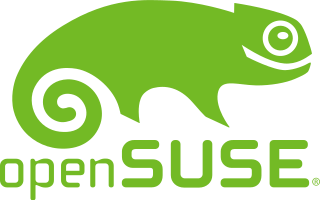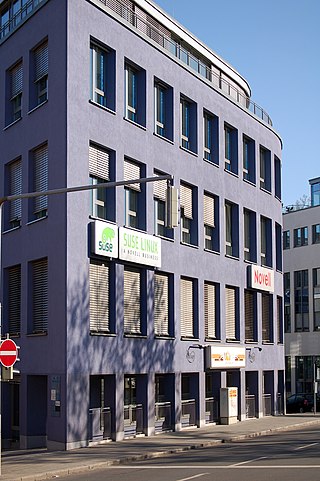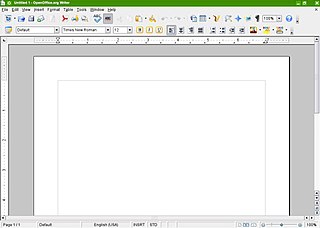
A Linux distribution is an operating system made from a software collection that includes the Linux kernel, and often a package management system. Linux users usually obtain their operating system by downloading one of the Linux distributions, which are available for a wide variety of systems ranging from embedded devices and personal computers to powerful supercomputers.

Miguel de Icaza is a Mexican programmer, best known for starting the GNOME, Mono, and Xamarin projects.

YaST is a Linux operating system setup and configuration tool.
Ximian, Inc. was an American company that developed, sold and supported application software for Linux and Unix based on the GNOME platform. It was founded by Miguel de Icaza and Nat Friedman in 1999 and was bought by Novell in 2003. Novell continued to develop Ximian's original products, while adding support for its own GroupWise and ZENworks software.

GNOME Evolution is the official personal information manager for GNOME. It has been an official part of GNOME since Evolution 2.0 was included with the GNOME 2.8 release in September 2004. It combines e-mail, address book, calendar, task list and note-taking features. Its user interface and functionality is similar to Microsoft Outlook. Evolution is free software licensed under the terms of the GNU Lesser General Public License (LGPL).

Nathaniel Dourif Friedman is an American technology executive and investor. He was the chief executive officer (CEO) of GitHub, and former Chairman of the GNOME Foundation. Friedman is currently a board member at the Arc Institute, and an advisor of Midjourney.

Novell, Inc. was an American software and services company headquartered in Provo, Utah, that existed from 1980 until 2014. Its most significant product was the multi-platform network operating system known as Novell NetWare.

Xandros, Inc. was a software company which sold Xandros Desktop, a Linux distribution. The name Xandros was derived from the X Window System and the Greek island of Andros. Xandros was founded in May 2001 by Linux Global Partners. The company was headquartered in New York City.

openSUSE is a free and open source RPM-based Linux distribution developed by the openSUSE project.

SUSE Linux Enterprise is a Linux-based operating system developed by SUSE. It is available in two editions, suffixed with Server (SLES) for servers and mainframes, and Desktop (SLED) for workstations and desktop computers. Its major versions are released at an interval of 3–4 years, while minor versions are released about every 12 months. SUSE Linux Enterprise products receive more intense testing than the upstream openSUSE community product, with the intention that only mature, stable versions of the included components will make it through to the released enterprise product.

SUSE is a German-based multinational open-source software company that develops and sells Linux products to business customers. Founded in 1992, it was the first company to market Linux for enterprise. It is the developer of SUSE Linux Enterprise and the primary sponsor of the community-supported openSUSE Linux distribution project. While the openSUSE "Tumbleweed" variation is an upstream distribution for both the "Leap" variation and SUSE Linux Enterprise distribution, its branded "Leap" variation is part of a direct upgrade path to the enterprise version, which effectively makes openSUSE Leap a non-commercial version of its enterprise product.
Caldera OpenLinux (COL) is a defunct Linux distribution. Caldera originally introduced it in 1997 based on the German LST Power Linux distribution, and then taken over and further developed by Caldera Systems since 1998. A successor to the Caldera Network Desktop put together by Caldera since 1995, OpenLinux was an early "business-oriented distribution" and foreshadowed the direction of developments that came to most other distributions and the Linux community generally.
SUSE Linux is a computer operating system developed by SUSE. It is built on top of the free and open source Linux kernel and is distributed with system and application software from other open source projects. SUSE Linux is of German origin, its name being an acronym of "Software und System-Entwicklung", and it was mainly developed in Europe. The first version appeared in early 1994, making SUSE one of the oldest existing commercial distributions. It is known for its YaST configuration tool.
An application launcher is a computer program that helps a user to locate and start other computer programs. An application launcher provides shortcuts to computer programs, and stores the shortcuts in one place so they are easier to find.

PackageKit is a free and open-source suite of software applications designed to provide a consistent and high-level front end for a number of different package management systems. PackageKit was created by Richard Hughes in 2007, and first introduced into an operating system as a default application in May 2008 with the release of Fedora 9.

Go-oo is a discontinued free office suite which started as a set of patches for OpenOffice.org, then later became an independent fork of OpenOffice.org with a number of enhancements, sponsored by Novell.
ZYpp is a package manager engine that powers Linux applications like YaST, Zypper and the implementation of PackageKit for openSUSE and SUSE Linux Enterprise. Unlike some more basic package managers, it provides a satisfiability solver to compute package dependencies. It is a free and open-source software project sponsored by Novell and licensed under the terms of the GNU General Public License v2 or later. ZYpp is implemented mostly in the programming language C++.

RPM Package Manager (RPM) is a free and open-source package management system. The name RPM refers to the .rpm file format and the package manager program itself. RPM was intended primarily for Linux distributions; the file format is the baseline package format of the Linux Standard Base.

ZENworks, a suite of software products developed and maintained by Micro Focus International for computer systems management, aims to manage the entire life cycle of servers, of desktop PCs, of laptops, and of handheld devices such as Android and iOS mobile phones and tablets. As of 2011 Novell planned to include Full Disk Encryption (FDE) functionality within ZENworks. ZENworks supports multiple server platforms and multiple directory services.














